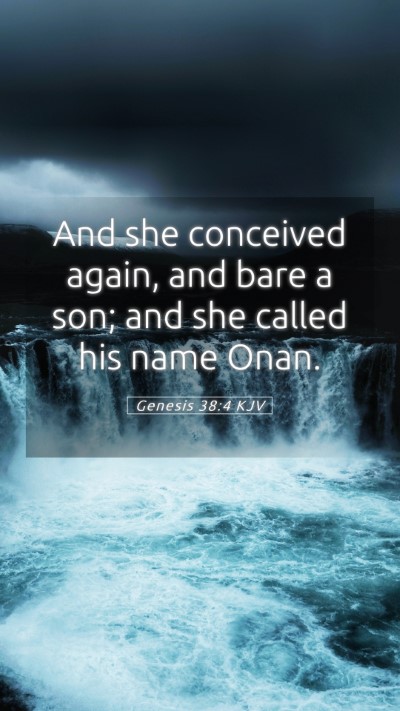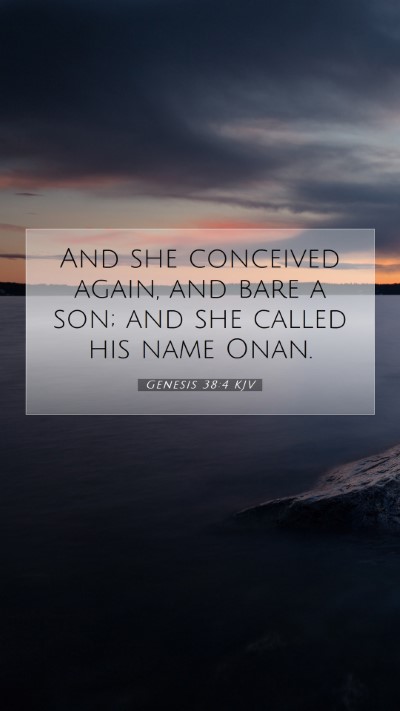Understanding Genesis 38:4
Bible Verse: Genesis 38:4
Scripture: "And she conceived again, and bare a son; and she called his name Onan."
Overview of the Verse
This verse narrates a pivotal moment in the lineage of Judah, reflecting on the responsibilities of family, lineage, and duties within the context of biblical law. The birth of Onan marks a significant step in the unfolding of Judaic heritage and anticipates future events of importance.
Bible Verse Meanings
Though simple in wording, Genesis 38:4 carries deeper implications for understanding biblical narratives and Jewish customs. The birth of Onan, as mentioned in this verse, sets the stage for critical themes such as duty to family, the practice of levirate marriage, and the complexities of human relationships.
Commentary Insights
-
Matthew Henry:
Henry emphasizes the significance of familial duties, particularly the obligations that Onan would inherit in light of his brother Er's death. The act of bringing forth offspring was not merely biological but a matter of societal and spiritual duty. This verse embodies the expectation of men to ensure the continuation of their family's name and legacy.
-
Albert Barnes:
Barnes elaborates on the importance of Onan's name, which signifies 'strength' or 'might.' He discusses how this highlights the anticipation of a strong lineage following Judah, a crucial element in God's unfolding plan. Barnes contextualizes Onan's birth amidst the challenges and responsibilities of the tribe of Judah.
-
Adam Clarke:
Clarke provides insight into the moral implications of the events surrounding Onan. He raises points regarding the nature of relationships in ancient customs and how God's laws shaped family life, including the role of women and the expectations placed upon men in preserving family lines.
Key Themes and Concepts
- Levirate Marriage:
This practice, referenced in Deuteronomy 25:5-10, shows the necessity for a brother to marry the widow of the deceased brother to keep the family lineage intact.
- Family Legacy:
The focus on progeny is paramount, reflecting the significance of heritage in the Jewish culture, where descendants are seen as a continuation of identity.
- Divine Plan:
The lineage of Judah is woven into the greater tapestry of biblical prophecy and fulfillment, culminating in significant events in the New Testament.
Bible Study Insights
When studying Genesis 38:4, one should consider the historical and cultural contexts surrounding the text. This includes understanding:
- The societal norms of ancient Israel.
- The importance placed on male heirs and family names.
- The spiritual implications of familial obligations as seen throughout the scripture.
Significance in Broader Scripture Context
Genesis 38:4 is pivotal not only in the story of Judah and Tamar but also in the broader narrative of God's covenant with Abraham and his descendants. It provides a glimpse into how God works through ordinary lives and complex relationships to bring about His divine purposes.
Cross References
- Genesis 38:8 - The command to perform levirate marriage.
- Deuteronomy 25:5-10 - Laws regarding levirate marriage.
- Matthew 1:3 - The genealogy of Jesus, which includes Judah and Tamar.
Application for Daily Life
The themes in Genesis 38:4 encourage reflection on our responsibilities to family and heritage. Understanding the full implications of our roles can guide us in our relationships and family commitments today.
Conclusion
This verse, while straightforward, forms a key part of the unfolding story of redemption and the implications of familial duties in God's design. The understanding of such scripture requires careful study and reflection, enabling believers to draw meaningful lessons from the text.


